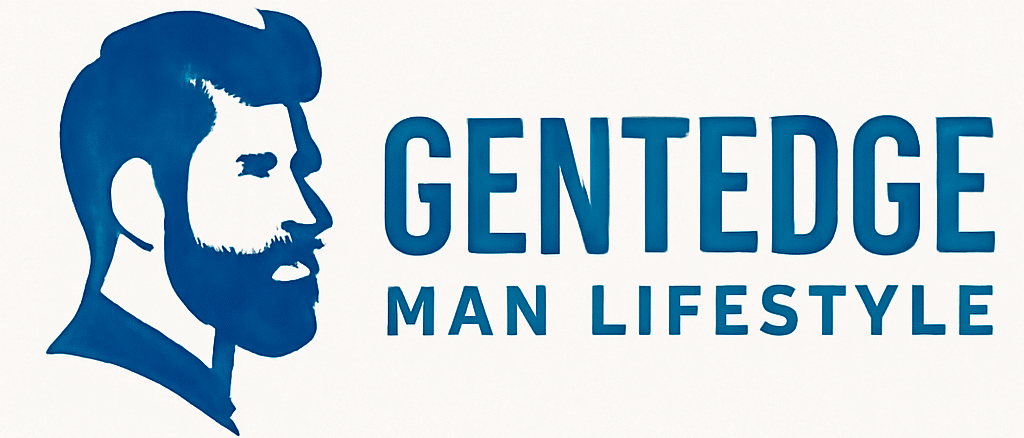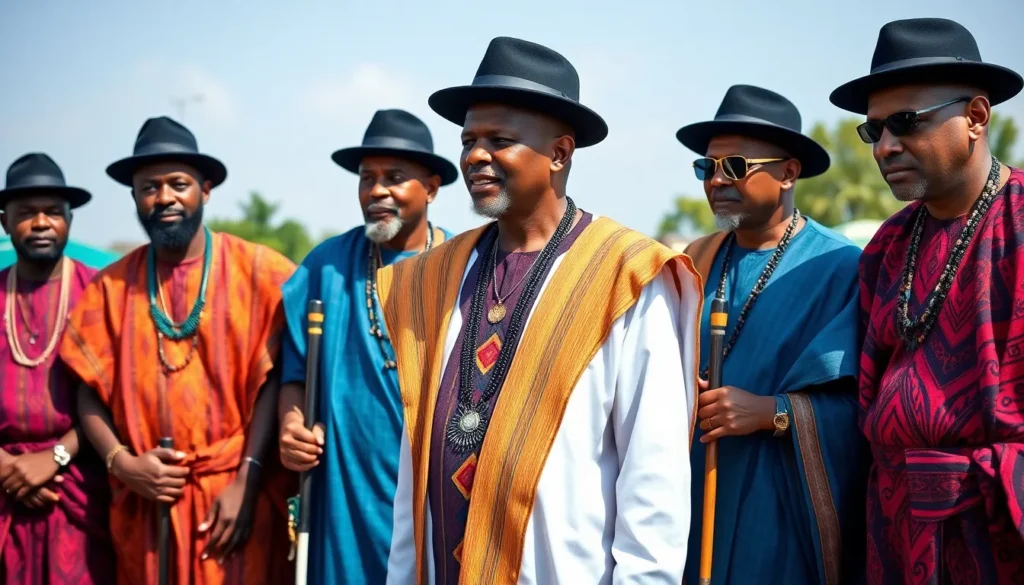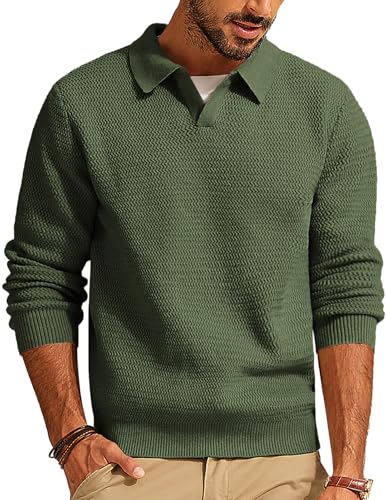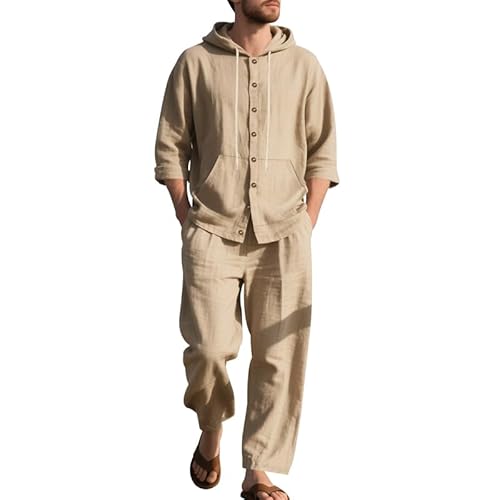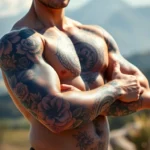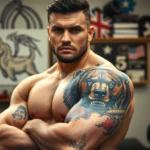The Ijaw people of Nigeria’s Niger Delta region have preserved one of Africa’s most distinctive and culturally rich traditional clothing styles for centuries. We’re about to explore the intriguing area of Ijaw men’s traditional attire that tells stories of heritage, status, and identity through every carefully chosen fabric and accessory.
From the iconic wrapper and shirt combinations to the elaborate headgear and symbolic jewelry, Ijaw men’s traditional dress reflects their deep connection to water, fishing, and community life. We’ll uncover how these garments have evolved while maintaining their authentic cultural significance in modern Nigeria.
Whether you’re planning to attend a traditional ceremony, researching African fashion, or simply curious about this remarkable culture, we’ve got everything you need to understand the beauty and meaning behind Ijaw men’s traditional attire. Let’s jump into this colorful journey through one of Nigeria’s most captivating cultural expressions.
Traditional Ijaw Wrapper (George Wrapper)
The George wrapper stands as the cornerstone of Ijaw men’s traditional attire, representing both elegance and cultural pride. We recognize this distinctive garment as more than clothing—it’s a symbol of status and heritage within Niger Delta communities.
Fabric Quality and Patterns
Premium silk and cotton blends form the foundation of authentic George wrappers, with imported materials from India and China commanding the highest respect. We observe that the finest wrappers feature intricate woven patterns including geometric designs, floral motifs, and symbolic representations of water elements that honor Ijaw fishing traditions.
Thread count and fabric weight distinguish quality George materials, with heavier fabrics indicating superior craftsmanship and durability. We find that authentic pieces showcase metallic thread work, often incorporating gold and silver accents that catch light during ceremonial movements.
Color combinations carry exact cultural meanings, with deep blues representing water connections, rich golds symbolizing prosperity, and burgundy tones indicating wisdom and maturity. Regional variations exist across different Ijaw communities, each maintaining distinct pattern preferences passed down through generations.
Proper Wrapping Techniques
Starting position requires holding the wrapper at waist level with the patterned side facing outward, ensuring adequate length for proper coverage and movement. We demonstrate that the initial wrap should begin from the left side, moving clockwise around the body while maintaining consistent tension.
Securing methods involve creating neat pleats at the front, typically three to five folds depending on the wrapper’s width and the wearer’s preference. We emphasize that the overlap should extend at least six inches beyond the starting point to prevent unwrapping during activities.
Final adjustments include checking the hem length, which traditionally falls between mid-calf and ankle, allowing for dignified walking while showcasing decorative footwear. Professional tailors often add discrete fastening points to ensure the wrapper remains properly positioned throughout extended ceremonies.
Ceremonial Significance
Wedding celebrations feature George wrappers as essential attire for grooms, family elders, and distinguished guests, with fabric choice reflecting the family’s social standing and respect for tradition. We document that certain patterns are reserved exclusively for matrimonial ceremonies, creating visual distinctions between different life events.
Traditional festivals showcase elaborate George wrapper displays, particularly during the New Yam Festival and fishing season celebrations where community leaders wear specially commissioned pieces. These occasions demonstrate how exact colors and patterns communicate messages about harvest success, community prosperity, and spiritual connections.
Age grade ceremonies use George wrappers to mark transitions between life stages, with young men receiving their first quality wrapper upon entering adulthood. We observe that the complexity of patterns often increases with age and social responsibility, creating a visual hierarchy that reinforces community structure and respect for elders.
Classic Ijaw Hat (Bowler Hat)
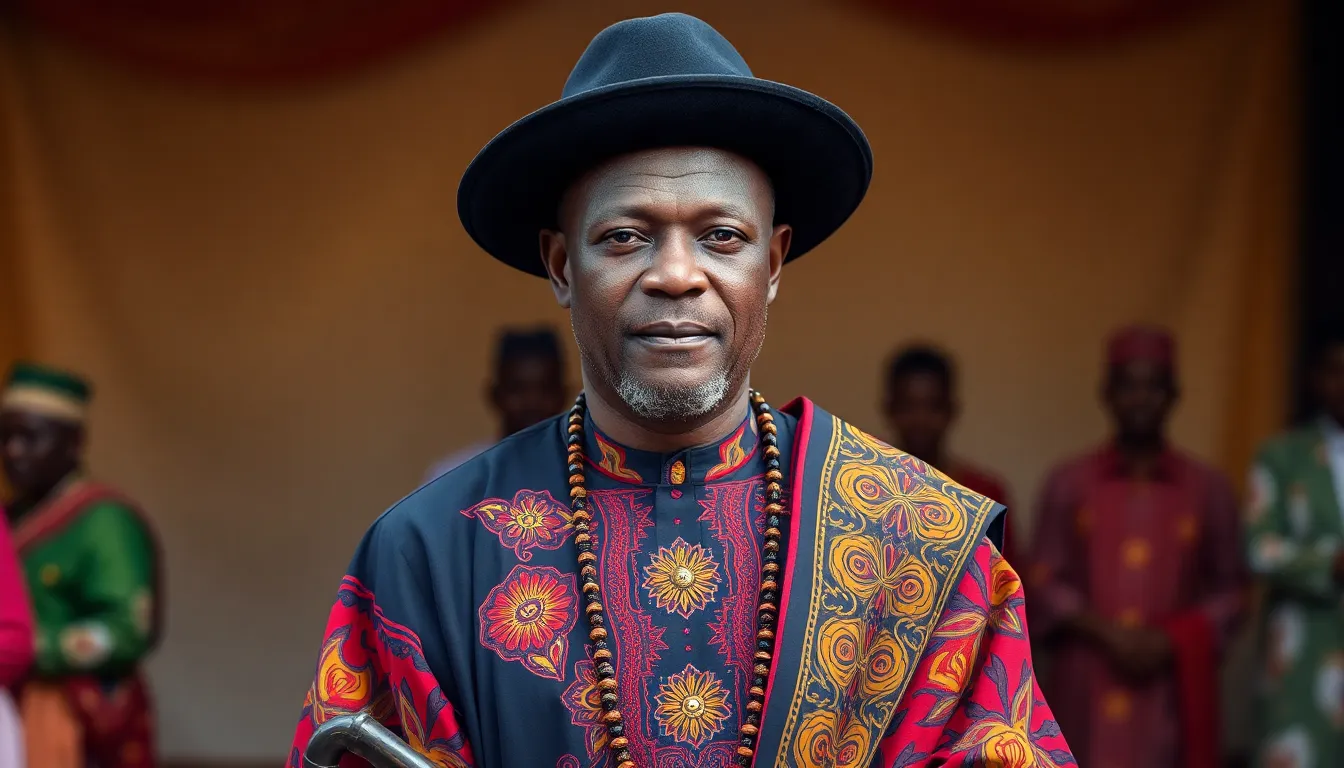
The black bowler hat stands as one of the most recognizable elements of Ijaw men’s traditional attire. We’ve observed how this distinctive headpiece transforms a simple outfit into a symbol of cultural identity and respectability.
Traditional Black Bowler Style
Black bowler hats represent the cornerstone of Ijaw men’s formal traditional wear. We recognize this style as either a Homburg or classic bowler design that complements the George wrapper perfectly. The hat’s deep black color creates a striking contrast against the often vibrant patterns of traditional fabrics.
Traditional styling emphasizes the hat’s role as more than just headwear. We see how Ijaw men pair these bowler hats with embroidered smart shirts and flowing wrappers to create a complete ceremonial ensemble. The combination produces a formal and dignified appearance that commands respect in community gatherings.
Cultural Symbolism and Status
Cultural pride radiates through every man who wears the traditional bowler hat. We understand that this headpiece serves as a cultural marker signaling identity and respectability within Ijaw society. The hat communicates social standing without requiring verbal explanation.
Status indicators emerge through the careful selection and presentation of the bowler hat. We observe how community members immediately recognize the dignity and respect associated with this traditional headwear. Walking sticks often accompany the hat to further enhance the image of cultural sophistication.
Ceremonial significance amplifies during festivals, weddings, and important community events. We witness how the bowler hat becomes essential for marking special occasions and demonstrating cultural affiliation. The headpiece transforms everyday interactions into displays of heritage and tradition.
Modern Variations and Adaptations
Contemporary Ijaw men blend traditional bowler hats with modern clothing styles. We notice how younger generations incorporate these classic headpieces with customized shirts and flowing materials that bridge heritage and contemporary fashion. The integration maintains cultural authenticity while embracing current trends.
Fashion evolution continues to honor traditional elements while allowing personal expression. We see how modern variations preserve the black bowler’s cultural significance while adapting to contemporary styling preferences. The hat remains a favored choice for men seeking to honor their heritage in modern contexts.
Hybrid styling approaches combine traditional and contemporary elements seamlessly. We appreciate how modern Ijaw men create unique looks that respect ancestral traditions while reflecting current fashion sensibilities. The bowler hat’s enduring appeal demonstrates its timeless relevance in Ijaw culture.
Traditional Ijaw Shirt (Etibo)
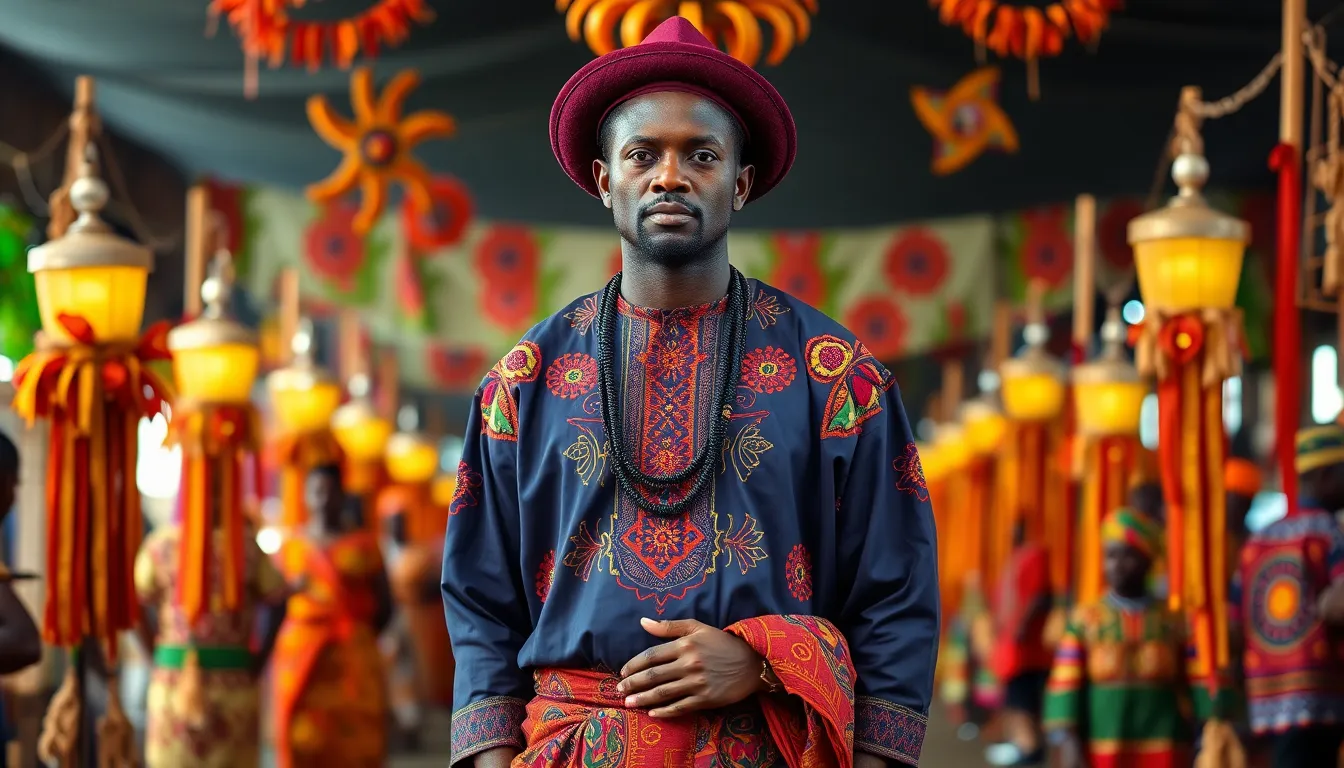
The Etibo stands as the cornerstone of Ijaw men’s formal attire, crafted from flowing fabrics that complement the Niger Delta’s warm climate. We see this long-sleeved shirt elevated through elaborate embroidery that transforms simple garments into cultural masterpieces.
Embroidered Designs and Motifs
Embroidered patterns on the Etibo shirt create intricate storytelling through vivid colors and symbolic designs. Artisans use bright threads to create motifs that communicate the wearer’s lineage, social standing, and cultural affiliations within the community. Each embroidered element serves dual purposes as decoration and communication, allowing observers to understand the wearer’s heritage at first peek.
Symbolic representations woven into these designs often reflect the Ijaw connection to water and fishing traditions. Craftspeople incorporate geometric patterns alongside nature-inspired motifs that honor ancestral customs. These embroidered details distinguish one family line from another, creating visual narratives that preserve cultural identity across generations.
Color Significance in Ijaw Culture
Bright colors dominate Ijaw traditional attire, conveying festivity, status, and community identity through carefully chosen hues. We observe how vibrant tones stand out in ceremonial settings, emphasizing the wearer’s importance and cultural pride. Color combinations on the Etibo shirt often correspond to exact occasions, with certain shades reserved for particular celebrations or social roles.
Traditional color palettes reflect the natural environment of the Niger Delta, incorporating blues that mirror waterways and greens representing lush vegetation. Ceremonial occasions call for bolder color choices, while everyday wear might feature more subdued yet still vibrant tones. Each color selection carries meaning, creating a visual language that community members understand instinctively.
Occasion-Exact Styling
Formal events showcase the Etibo shirt paired with George wrappers instead of conventional trousers, creating a distinguished silhouette. We find this combination particularly prominent during traditional weddings, festivals, and age grade ceremonies where cultural authenticity takes precedence. The flowing wrapper extends from waist to ankles, crafted from rich fabrics like George, damask, or Ankara that complement the embroidered shirt.
Accessories complete the formal Etibo ensemble, including traditional hats such as bowlers or homburgs that add dignity to the overall appearance. Walking sticks serve as ceremonial accessories that enhance the wearer’s stature during important community gatherings. These styling choices emphasize respect, cultural affiliation, and social standing within Ijaw society, particularly during important life events and religious celebrations.
Ijaw Walking Stick and Accessories
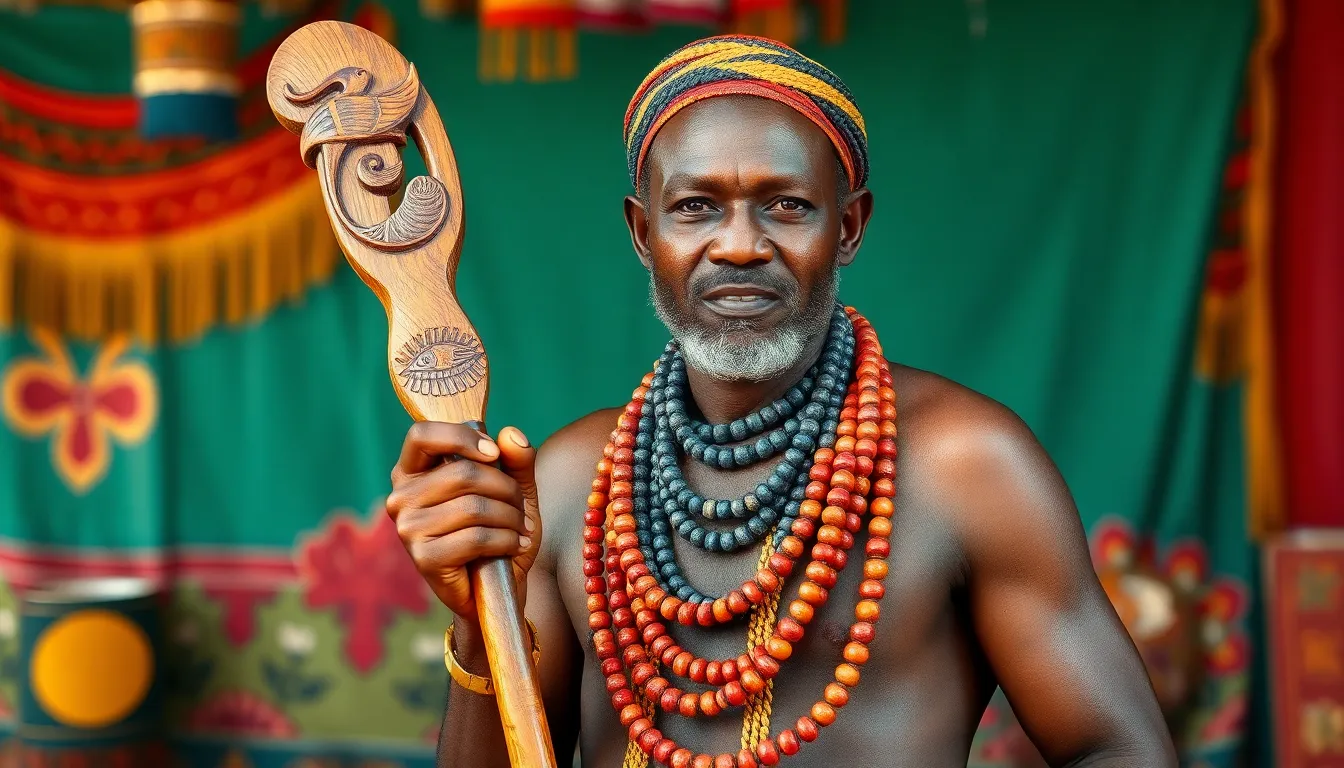
Walking sticks and traditional accessories complete the sophisticated ensemble of Ijaw men’s ceremonial attire. These elements serve both functional and symbolic purposes in Ijaw culture.
Carved Wooden Walking Sticks
Carved wooden walking sticks represent authority and wisdom in Ijaw traditional society. These handcrafted pieces feature intricate designs that tell stories of fishing traditions, water spirits, and ancestral heritage. Master craftsmen carve symbols like fish, waves, and traditional Ijaw motifs into the wood using techniques passed down through generations.
Quality walking sticks are typically made from durable hardwoods like mahogany or iroko wood. The carving process can take several weeks to complete, with artisans paying careful attention to symbolic details that reflect the owner’s social status. Elders and community leaders often carry walking sticks adorned with metal caps or decorative elements made from brass or copper.
Different regions within Ijaw territory have distinct carving styles and preferred motifs. Bayelsa State craftsmen often incorporate crocodile designs, while those from Rivers State favor wave patterns that honor their maritime heritage. The length of the walking stick traditionally corresponds to the bearer’s height, ensuring both comfort and proper ceremonial presentation.
Traditional Jewelry and Beads
Traditional jewelry forms an essential component of Ijaw men’s ceremonial dress. Coral beads hold particular significance, symbolizing prosperity and connection to ancestral spirits. We often see men wearing multiple strands of coral beads around their necks during important ceremonies and festivals.
Brass bracelets and armlets complement the coral beads, creating layers of traditional ornamentation. These metal accessories are often engraved with traditional Ijaw symbols and passed down through family lines. Gold jewelry, when worn, typically includes chains and pendants that feature symbols of fishing nets, canoes, or water-related motifs.
Ankle bracelets made from brass or copper are common among younger men participating in traditional dances. The jingling sound they create during movement adds a musical element to ceremonial performances. Finger rings made from precious metals often bear clan symbols or family crests that identify the wearer’s lineage within the community.
Symbolic Accessories for Elders
Elder accessories carry profound cultural meaning and command respect within Ijaw society. Ceremonial fans made from palm fronds or feathers serve both practical and symbolic purposes during traditional gatherings. These fans often feature decorative handles carved with symbols of wisdom and community leadership.
Traditional medicine pouches, worn as shoulder bags or attached to walking sticks, represent the elder’s role as a keeper of ancestral knowledge. These leather or woven pouches contain symbolic items rather than practical medicines, serving as visual reminders of the elder’s spiritual responsibilities. The patterns and colors of these pouches often correspond to exact clans or family groups.
Feathered headdresses reserved for the most senior community members showcase elaborate arrangements of locally sourced bird feathers. These ceremonial pieces require special care and are only worn during the most important cultural events. The number and type of feathers used often correlate with the elder’s achievements and contributions to community welfare.
Modern Adaptations of Ijaw Traditional Attire for Men
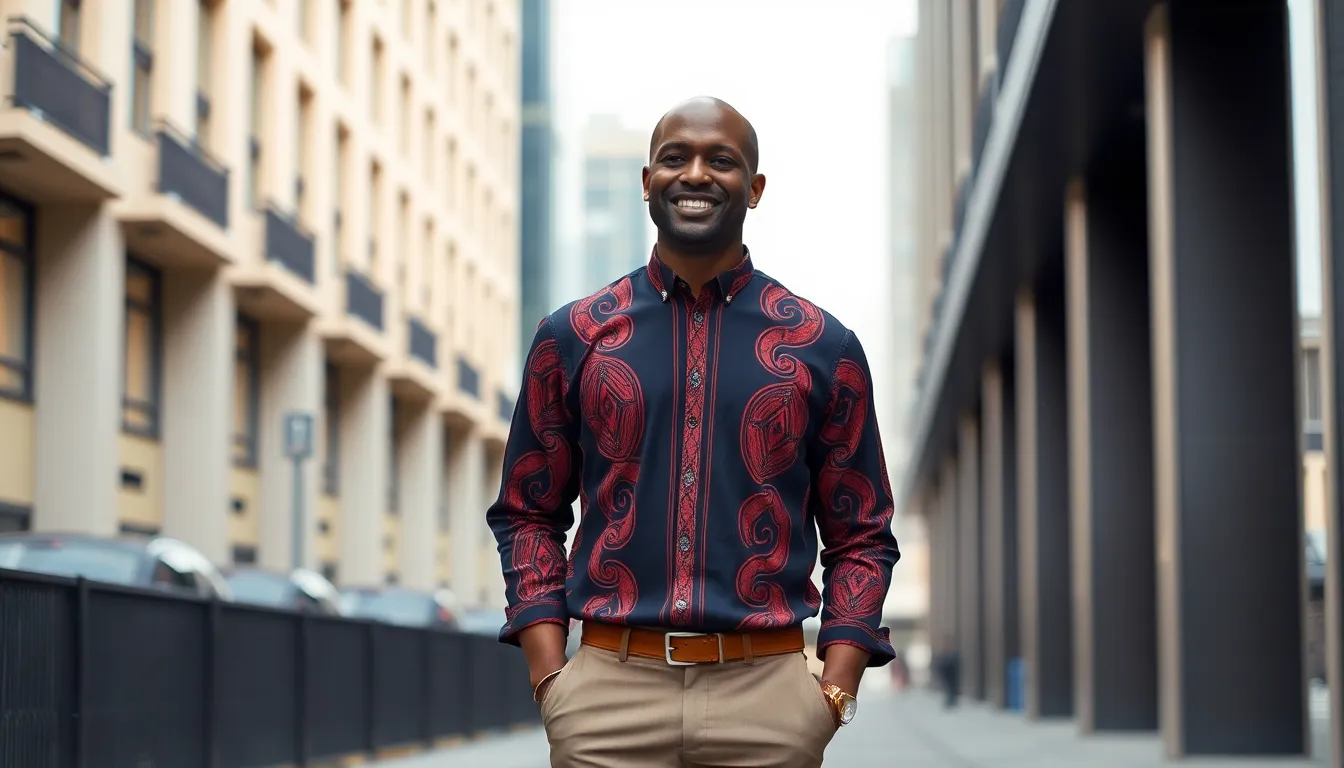
Today’s Ijaw men skillfully blend ancestral clothing traditions with contemporary fashion sensibilities. We see these adaptations preserving cultural heritage while meeting modern lifestyle demands.
Contemporary Fashion Fusion
Fashion designers now incorporate traditional George and Ankara prints into customized suits and casual wear pieces. We observe how these contemporary creations maintain cultural authenticity through fabric choices while embracing global fashion trends. Skilled artisans transform classic Etibo shirt silhouettes into fitted blazers and button-down shirts that work in professional settings.
Modern cuts replace traditional flowing designs without losing the essence of Ijaw identity. We notice young professionals wearing George print bow ties and pocket squares with Western suits during business meetings. Ankara fabric appears in contemporary shirt designs, trousers, and even sneakers that celebrate Niger Delta heritage.
Creative combinations allow men to express cultural pride through fashion-forward pieces. We see traditional motifs appearing on modern accessories like watches, cufflinks, and leather goods that complement Western attire.
Formal Event Styling
Wedding ceremonies and cultural festivals showcase enhanced traditional attire with modern embroidery techniques. We witness sharply customized Etibo shirts paired with traditional George wrappers creating sophisticated formal looks. Contemporary alterations include fitted cuts that maintain the shirt’s cultural significance while providing better silhouettes.
Modern formal styling replaces traditional wrappers with customized trousers for comfort and elegance. We observe how traditional accessories like bowler hats and walking sticks receive stylized updates with minimalist designs. Premium fabrics like silk blends and high-quality cotton elevate the traditional ensemble for special occasions.
Enhanced embroidery work incorporates metallic threads and contemporary patterns alongside traditional motifs. We see formal events where men wear traditional coral bead necklaces with modern formal shirts, creating striking cultural statements.
Everyday Wear Modifications
Casual adaptations feature lighter fabrics and shorter wrapper lengths for practical daily wear. We notice men choosing breathable cotton and linen blends instead of heavy traditional materials for comfort in Nigeria’s climate. Modern versions of the Etibo shirt pair seamlessly with jeans and chinos while maintaining cultural elements.
Everyday modifications include simplified versions of traditional patterns printed on t-shirts and polo shirts. We see casual interpretations where traditional George print appears on shorts, caps, and casual footwear for weekend wear. Practical adjustments allow men to wear cultural elements without full traditional dress requirements.
Contemporary accessories like printed face masks, phone cases, and backpacks feature traditional Ijaw motifs for daily cultural expression. We observe how these modifications ensure cultural relevance while adapting to modern lifestyles and professional environments.
Ijaw Wedding and Ceremonial Attire
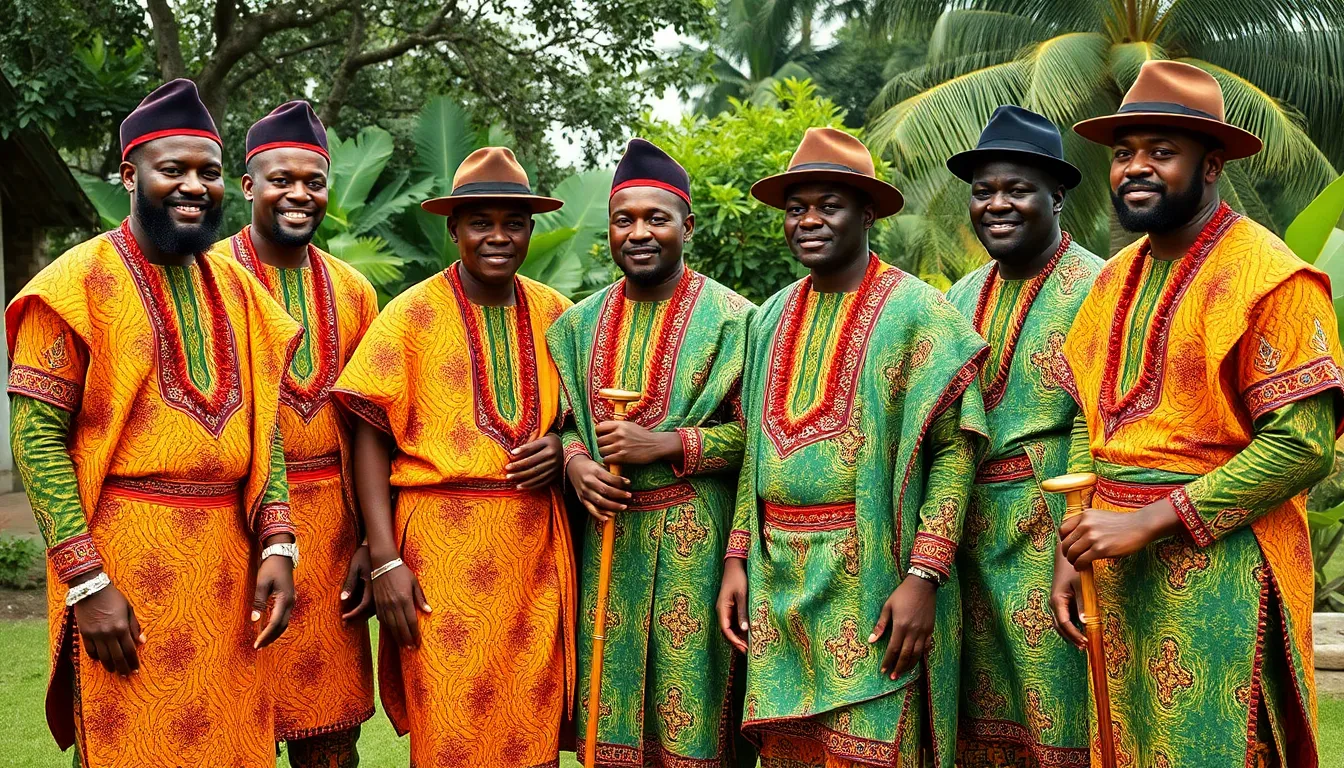
Wedding ceremonies and special celebrations showcase the pinnacle of Ijaw men’s traditional fashion. These occasions demand the finest traditional garments that reflect cultural pride and family heritage.
Groom’s Traditional Ensemble
Grooms embrace the elegance of the George wrapper as their primary ceremonial garment during wedding celebrations. This richly patterned fabric wraps around the waist and extends to the ankles, creating a dignified silhouette that commands respect. Originally from India, George cloth has become the signature fabric for Ijaw ceremonial wear due to its luxurious texture and vibrant patterns.
Long-sleeved shirts complement the George wrapper perfectly, featuring flowing materials that suit the Niger Delta’s warm climate. Embroidered details on these shirts often showcase bright colors and intricate designs that reflect the groom’s family lineage. Smart tailoring ensures the shirt drapes elegantly while allowing comfortable movement during lengthy wedding ceremonies.
Traditional accessories complete the groom’s ensemble with symbolic significance. Bowler or homburg hats crown the outfit, representing dignity and cultural respectability within the community. Walking sticks serve as both functional and ceremonial items, symbolizing the groom’s transition into married life and his role as a future family leader.
Special Occasion Garments
Festival attire prioritizes the George fabric’s bright colors and elaborate patterns that capture attention during cultural celebrations. These garments reflect the Ijaw people’s riverine environment through lightweight construction that remains visually striking in hot, swampy conditions. Ceremonial occasions call for the most vibrant examples of George cloth, with patterns that tell stories of fishing traditions and ancestral heritage.
Wedding guest attire follows similar principles but allows for more personal expression in pattern selection. Men choose George wrappers with colors that complement the wedding party while maintaining appropriate respect for the ceremony. Embroidered shirts for special occasions feature motifs that honor water spirits and fishing prosperity, connecting wearers to their cultural roots.
Cultural festivals showcase the full spectrum of Ijaw ceremonial wear, with participants displaying their finest traditional garments. Age grade ceremonies and community celebrations provide opportunities for men to wear inherited pieces alongside newly acquired ceremonial attire. These events strengthen cultural bonds while preserving traditional fashion knowledge for future generations.
Family Heirloom Pieces
Inherited George wrappers carry profound cultural significance as they pass from fathers to sons across generations. These treasured fabrics often feature rare patterns or exceptional craftsmanship that’s no longer commonly available. Families preserve these heirloom pieces for the most important occasions, including weddings, naming ceremonies, and traditional title installations.
Embellished shirts with ancestral embroidery represent family artistic traditions and social standing within the community. Craftsmen who created these garments often incorporated unique design elements that identified exact family lineages or achieved social positions. Contemporary family members wear these shirts with pride, maintaining connections to their ancestral heritage while participating in modern celebrations.
Traditional accessories like carved walking sticks and ceremonial jewelry frequently serve as family heirlooms with deep symbolic meaning. These pieces carry stories of family achievements, traditional roles, and community leadership across multiple generations. Elders carefully select which family members receive these treasured items, ensuring cultural knowledge and family history continue through tangible objects that connect past and present.
Regional Variations Across Ijaw Communities
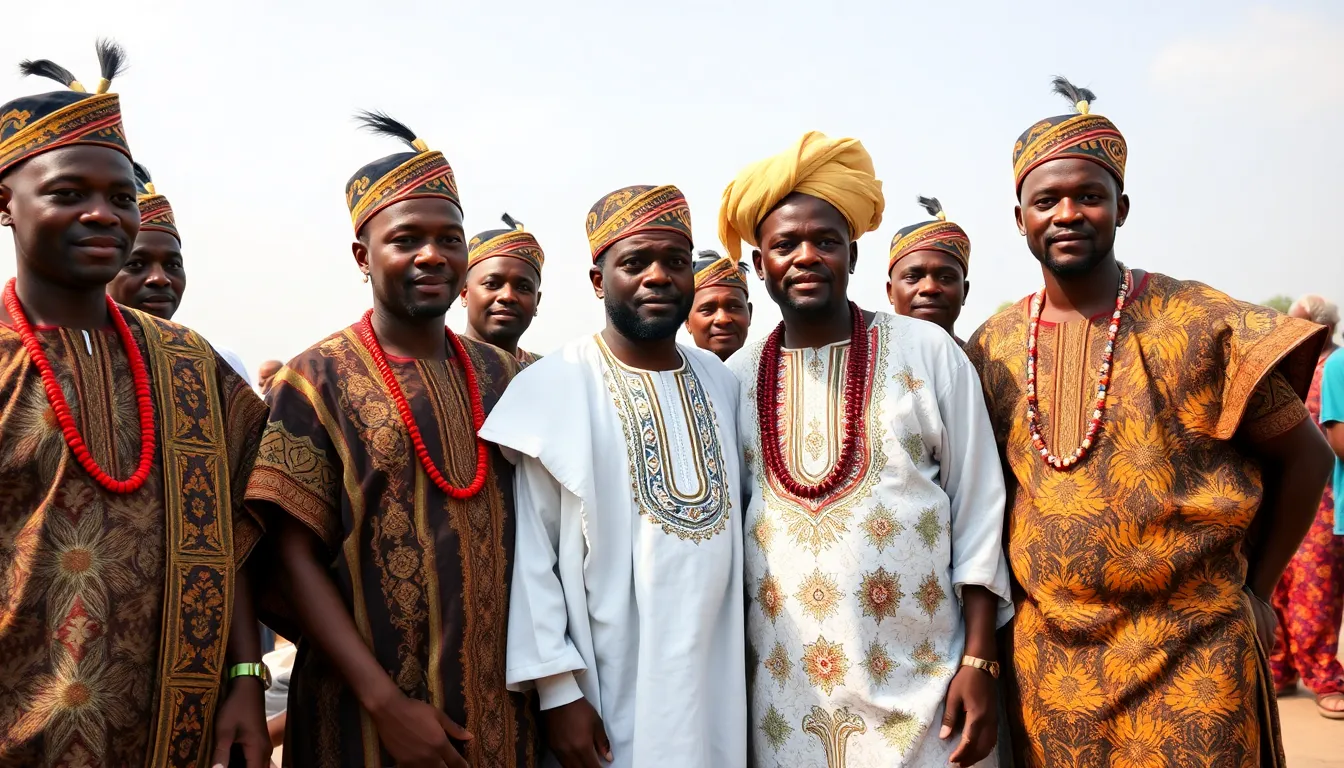
While the core elements of Ijaw men’s traditional attire remain consistent throughout the Niger Delta, we observe distinct regional variations that reflect each community’s unique cultural nuances and local preferences.
Bayelsa State Traditional Styles
George wrappers dominate the traditional attire scene in Bayelsa, where men choose rich fabrics like damask and Ankara over conventional trousers. These flowing garments wrap around the waist and cascade to the ankles, creating an elegant silhouette that honors ceremonial traditions. Premium imported George fabric has become locally embraced for special occasions, representing both cultural pride and sophisticated taste.
Formal shirts feature intricate embroidery and vibrant colors that complement the George wrappers perfectly. Long sleeves remain the preferred style, offering both formality and protection from the delta’s climate. Men enhance their attire with distinctive hats such as bowler or homburg styles, which convey dignity and command respect in social settings.
Walking sticks serve as essential accessories that complete the traditional ensemble in Bayelsa. These carefully selected pieces symbolize wisdom and authority while adding an element of refined sophistication to the overall appearance.
Rivers State Ijaw Attire
Rivers State maintains similar styling principles while incorporating unique garment names and cultural classifications. Men wear George cloth paired with flowing shirts called Etibor or Opu Shirti, which showcase the region’s exact terminology for traditional wear. Smart, well customized cuts distinguish Rivers State fashion choices from neighboring communities.
Traditional garments like the Wokor or Angapu represent exact cultural categories within Rivers State Ijaw communities. Title related attire includes Don/Amanyanabo and Half Don designations that signify cultural status and social hierarchy. These specialized garments appear prominently during traditional occasions and festivals, where proper dress communicates respect for cultural protocols.
Ceremonial events showcase the full range of Rivers State traditional attire, with exact combinations reserved for different types of celebrations and community gatherings.
Delta State Cultural Differences
Delta State Ijaw communities maintain the fundamental George wrapper and embroidered shirt combination while adding distinctive local touches. Stylistic differences appear in pattern selections, color combinations, and accessory choices that reflect regional preferences and cultural interpretations. These variations demonstrate how local traditions influence broader Ijaw fashion principles.
Embroidery techniques in Delta State incorporate unique motifs that highlight the area’s exact heritage within Ijaw culture. Local artisans create distinctive patterns that tell stories of their particular communities while honoring overarching Ijaw traditions. Color palettes often reflect regional preferences that distinguish Delta State attire from other Ijaw territories.
Traditional accessories follow regional customs that may emphasize different symbolic elements or incorporate locally important materials and designs.
Proper Care and Maintenance of Ijaw Traditional Clothing
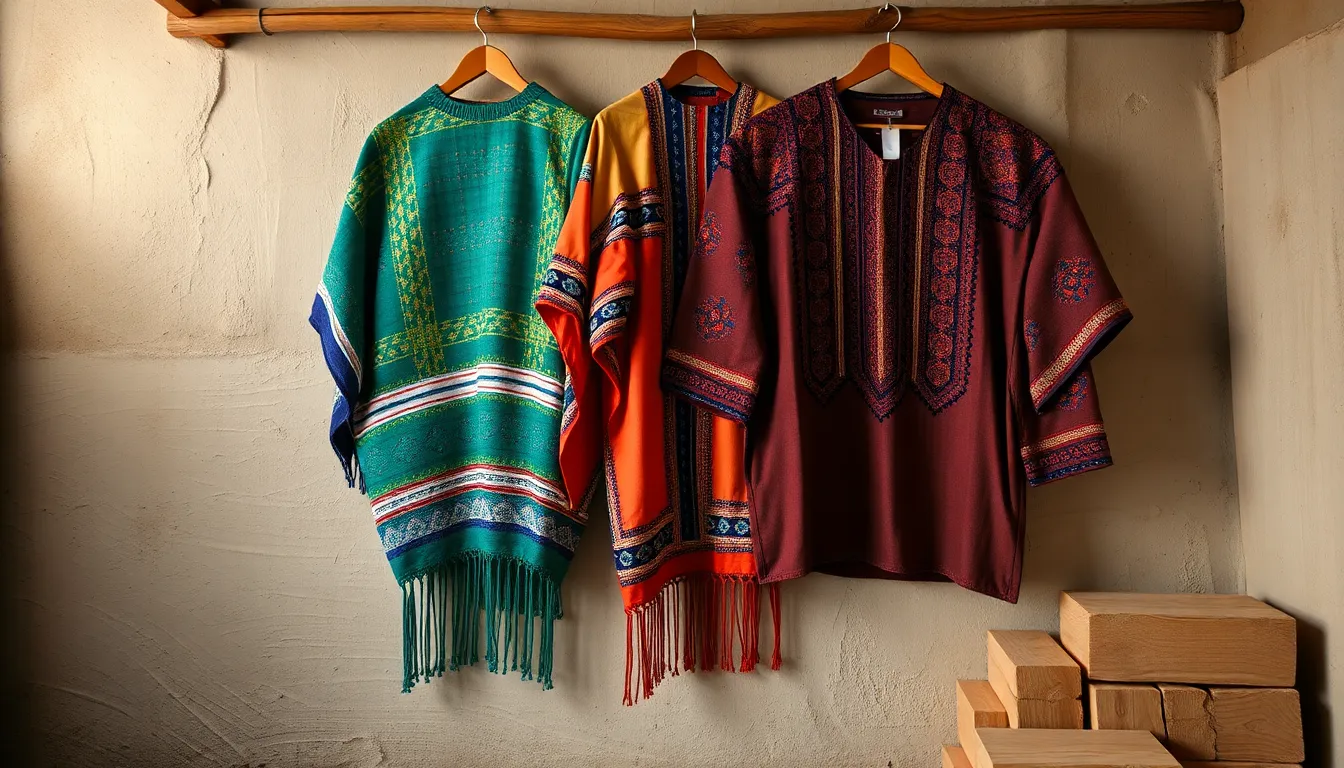
Preserving our cherished Ijaw traditional garments requires dedicated attention to ensure they remain vibrant for generations. We must understand that proper maintenance techniques protect the cultural heritage embedded in each George wrapper and embroidered Etibo shirt.
Fabric Preservation Techniques
Protecting vibrant colors starts with limiting direct sunlight exposure, particularly for George wrappers and embroidered shirts that feature brilliant hues. We recommend storing these garments away from windows and bright lights to prevent fading of the intricate patterns that honor our fishing traditions.
Gentle handling becomes essential when dealing with delicate embroidery work on ceremonial pieces. Our hands should be clean and dry when touching these fabrics, and we should avoid pulling or stretching the embroidered areas that tell stories of our lineage.
Mild detergents work best for cleaning traditional fabrics like George, damask, and Ankara materials. We suggest using pH neutral cleaners specifically designed for delicate textiles to maintain the integrity of both the fabric and its decorative elements.
Temperature control plays a crucial role in fabric preservation, as excessive heat can damage silk and cotton blends commonly found in our traditional attire. We should avoid hot water washing and high heat drying for these precious garments.
Storage Methods for Ceremonial Pieces
Cool, dry environments provide the ideal conditions for storing our ceremonial George wrappers and embroidered shirts. We must ensure storage areas remain free from humidity and moisture to prevent mold growth and fabric deterioration.
Breathable garment bags offer excellent protection while allowing air circulation around our traditional clothing. We can also wrap pieces in clean cotton cloth to shield them from dust and insects without trapping moisture.
Proper folding techniques require special attention for heavily embroidered areas of our Etibo shirts and ceremonial accessories. We should roll garments when possible or use padded hangers to prevent creases that could damage intricate designs.
Cedar blocks naturally repel insects while maintaining the fresh scent of our stored traditional attire. We place these blocks in storage containers to protect against moths and other pests that might damage our cultural garments.
Professional Cleaning Recommendations
Experienced dry cleaners who understand traditional African fabrics provide the best care for our George wrappers and ceremonial pieces. We should seek professionals familiar with handling delicate embroidery and cultural textiles to ensure proper treatment.
Fabric identification helps cleaning professionals choose appropriate methods for our traditional garments. We must inform cleaners about the exact materials, whether George, damask, or Ankara, and highlight any delicate embroidery or beadwork.
Specialized cleaning processes preserve both color vibrancy and fabric texture in our ceremonial attire. We should request gentle cleaning cycles and avoid harsh chemicals that could damage the intricate patterns representing our cultural heritage.
Pre-cleaning consultation allows us to discuss exact concerns about stains, wear patterns, or fragile areas on our traditional clothing. We can work with professionals to develop customized care plans for our most treasured ceremonial pieces.
Where to Purchase Authentic Ijaw Traditional Attire for Men
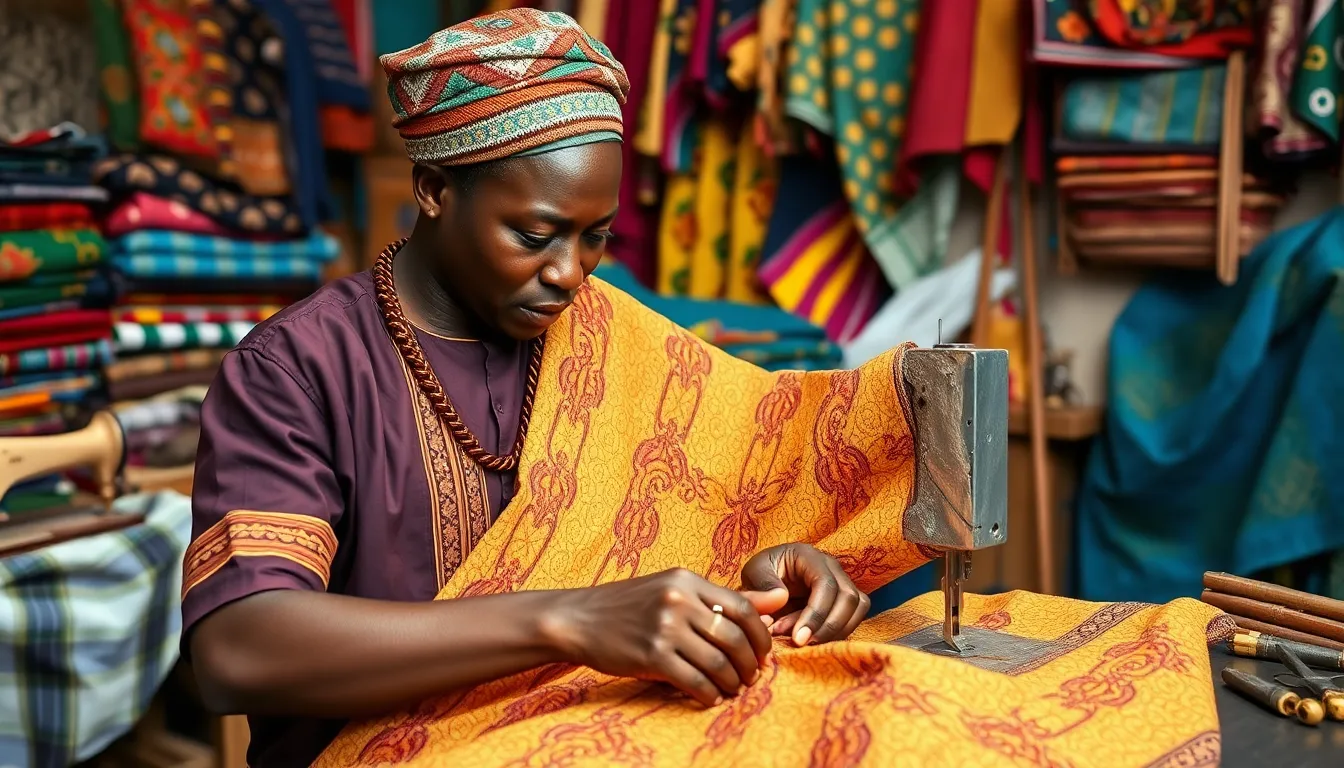
Finding genuine Ijaw traditional clothing requires knowing where to look for authentic pieces that honor the cultural heritage we’ve explored. We’ve identified the most reliable sources for acquiring these meaningful garments.
Local Artisans and Craftspeople
Local tailors and craftspeople within the Niger Delta region offer the most authentic Ijaw traditional attire available. These skilled artisans possess generations of traditional knowledge about the exact fabrics, designs, and tailoring techniques that define genuine Ijaw clothing. We recommend seeking out experienced tailors in Bayelsa, Rivers, and Delta States who specialize in creating George wrappers and embroidered Etibo shirts.
Master craftspeople in these regions understand the cultural significance behind every stitch and pattern. Their expertise ensures that each garment reflects the proper proportions, fabric weights, and traditional construction methods passed down through Ijaw families. Working directly with local artisans also supports the preservation of these traditional skills while guaranteeing authenticity in every piece.
Community elders often recommend trusted tailors who’ve served Ijaw families for decades. These craftspeople typically source their materials from established suppliers and maintain relationships with fabric merchants who understand the quality standards required for ceremonial attire.
Online Retailers and Cultural Stores
Specialized African clothing stores and online marketplaces provide convenient access to authentic Ijaw traditional wear for customers outside the Niger Delta. Instagram shops and cultural boutiques focusing on Nigerian ethnic wear often stock genuine George wrappers, embroidered shirts, and traditional accessories like bowler hats and walking sticks.
Reputable online platforms connect customers with verified sellers who understand the cultural importance of authentic Ijaw attire. We suggest researching sellers who provide detailed fabric information, including thread counts and pattern origins, to ensure quality purchases. Many established online retailers offer customer reviews and authenticity guarantees for their traditional African clothing collections.
Cultural stores in major Nigerian cities and international African communities frequently carry Ijaw traditional pieces. These retailers often work directly with Niger Delta suppliers and maintain quality standards that reflect genuine cultural traditions.
Custom Tailoring Services
Custom tailoring services specializing in Nigerian traditional clothing provide the most personalized approach to acquiring authentic Ijaw attire. These professional tailors create bespoke garments that honor traditional styles while ensuring perfect fit and cultural accuracy. Commission work guarantees adherence to exact family traditions and personal preferences for ceremonial occasions.
Experienced custom tailors understand the intricate details that distinguish authentic Ijaw clothing from generic African wear. They source premium George fabrics, execute traditional embroidery techniques, and create garments that meet the exact specifications required for weddings, festivals, and other cultural ceremonies.
Many custom tailoring services offer consultation sessions where we can discuss cultural requirements, fabric preferences, and design elements that reflect personal heritage. This collaborative approach ensures that each garment carries the proper cultural significance while meeting individual style preferences and ceremonial needs.
Conclusion
We’ve explored the rich tapestry of Ijaw men’s traditional attire that continues to thrive in Nigeria’s Niger Delta region. These garments represent far more than clothing – they’re living symbols of cultural identity that connect modern Ijaw men to their ancestral heritage.
The evolution from purely traditional pieces to contemporary adaptations shows how cultural preservation can coexist with modern fashion sensibilities. Whether you’re attending a ceremonial event or simply appreciating African fashion heritage these timeless styles offer authentic ways to honor Ijaw culture.
As we support local artisans and embrace proper garment care we ensure these beautiful traditions remain vibrant for future generations to cherish and wear with pride.
Frequently Asked Questions
What is the most important piece of Ijaw men’s traditional attire?
The George wrapper is the cornerstone of Ijaw men’s traditional clothing, symbolizing elegance and cultural pride. Made from premium silk and cotton blends, authentic George wrappers feature intricate designs that honor Ijaw fishing traditions. The fabric’s quality is determined by weight and thread count, with specific patterns and colors communicating social status and community values during ceremonial occasions.
How do you properly wrap a George wrapper for formal occasions?
Proper George wrapper technique requires neat pleats and secure fastening for ceremonial events. The wrapper should be folded with precision, creating clean lines that maintain the garment’s dignified appearance. The wrapping method varies slightly depending on the specific ceremony, but the emphasis is always on creating a polished, respectful presentation that honors Ijaw cultural traditions.
What is the significance of the Ijaw bowler hat?
The classic Ijaw bowler hat is a distinctive headpiece that symbolizes cultural identity and respectability. Typically black, it complements the George wrapper and serves as a cornerstone of formal wear. The hat acts as a cultural marker of social standing and is often paired with walking sticks to enhance sophistication at community gatherings and ceremonies.
What makes the Etibo shirt special in Ijaw culture?
The Etibo shirt features flowing fabrics and elaborate embroidery designed for the Niger Delta’s warm climate. The embroidered designs communicate the wearer’s lineage and social standing, with motifs honoring the Ijaw connection to water and fishing traditions. Vibrant colors convey festivity and status, with specific combinations reserved for particular occasions like weddings and festivals.
What role do walking sticks play in Ijaw men’s ceremonial attire?
Carved wooden walking sticks symbolize authority and wisdom in Ijaw culture. They feature intricate designs reflecting fishing traditions and ancestral heritage, with craftsmanship varying by region. These accessories enhance the wearer’s stature and cultural affiliation, particularly when paired with traditional hats during formal ceremonies and community gatherings.
How has modern fashion influenced traditional Ijaw attire?
Contemporary Ijaw men blend ancestral clothing with modern fashion by incorporating traditional George and Ankara prints into customized suits and casual wear. Designers use modern embroidery techniques and fitted cuts for formal events, while everyday adaptations feature lighter fabrics and simplified patterns for practicality while maintaining cultural authenticity.
What should grooms wear during Ijaw weddings?
Grooms traditionally wear George wrappers as the primary garment, complemented by long-sleeved shirts with embroidered designs reflecting family lineage. The ensemble is completed with bowler hats and walking sticks, symbolizing dignity and leadership. Vibrant George fabric patterns are prioritized, and family heirloom pieces add cultural significance connecting the groom to ancestry.
Are there regional differences in Ijaw traditional attire?
Yes, while core elements remain consistent, distinct styles emerge across Bayelsa, Rivers, and Delta States. Bayelsa favors George wrappers with flowing shirts and distinctive hats. Rivers State features unique garment names and classifications signifying cultural status. Delta State showcases local embroidery techniques and color palettes that distinguish its attire from other regions.
How should Ijaw traditional clothing be cared for and maintained?
Proper care involves limiting sunlight exposure, gentle handling, and using mild detergents for cleaning. Store garments in breathable garment bags with cedar blocks to protect against pests. Professional cleaning services familiar with traditional African fabrics are recommended to ensure longevity and vibrancy. Regular maintenance preserves these cultural garments for future generations.
Where can you buy authentic Ijaw traditional attire?
Authentic Ijaw clothing is best sourced from local artisans and craftspeople in the Niger Delta who possess traditional knowledge and skills. Online retailers and cultural stores also provide access to genuine pieces. Custom tailoring services offer personalized, culturally accurate garments. Supporting local craftsmanship ensures authenticity and cultural integrity while preserving traditional skills.
